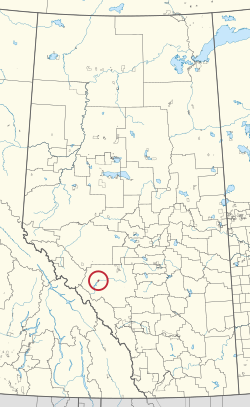
Back Reserva índia Big Horn 144a Catalan Big Horn 144A CEB Big Horn 144A Swedish Біг-Горн 144A Ukrainian
Big Horn 144A | |
|---|---|
| Big Horn Indian Reserve No. 144A | |
 Location in Alberta | |
| First Nations | Stoney Nakoda |
| Treaty | 6 |
| Country | Canada |
| Province | Alberta |
| Municipal district | Clearwater |
| Area | |
| • Total | 2,127.4 ha (5,256.9 acres) |
| Population (2016)[2] | |
| • Total | 237 |
| • Density | 11/km2 (29/sq mi) |
Big Horn 144A is an Indian reserve of the Stoney Nakoda First Nation, comprising Bearspaw, Chiniki, and Wesley First Nations in Alberta, located within Clearwater County.[3][1] In the 2016 Canadian Census, it recorded a population of 237 living in 44 of its 59 total private dwellings.[2][4]
Formed in 1948, Big Horn 144A is roughly 100 miles north of the main Stoney reserve at Morley.[5]
According to the 2011 national Community Well Being Index, it is the poorest First Nations community in Canada. [6]
- ^ a b "Reserve/Settlement/Village Detail". Crown–Indigenous Relations and Northern Affairs Canada. Government of Canada. Retrieved August 12, 2019.
- ^ a b "Census Profile, 2016 Census". Statistics Canada. February 8, 2017. Retrieved 2019-08-10.
- ^ Government of Alberta (May 25, 2019). Municipal Boundaries (Map). AltaLIS.
- ^ Sturtevant, William C.; DeMallie, Raymond J. (2001). Handbook of North American Indians, V. 13, Plains, Pt. 1-2 (Two Books). Government Printing Office. p. 596. ISBN 9780160504006. Retrieved 12 December 2017.
- ^ Mason, Courtney W. (2014). Spirits of the Rockies: Reasserting an Indigenous Presence in Banff National Park. University of Toronto Press. p. 164. ISBN 9781442626683. Retrieved 12 December 2017.
- ^ Canada, Government of Canada; Indigenous and Northern Affairs. "The Community Well-Being (CWB) Index, 1981-2011". www.aadnc-aandc.gc.ca. Archived from the original on 2018-07-16. Retrieved 2018-07-24.
{{cite web}}: CS1 maint: multiple names: authors list (link)